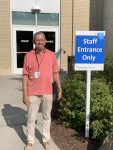Local Volunteer Pays it Forward to Hospital Patients
By Abby Luby
When Michael Dymant walks into a patient’s room at Northern Westchester Hospital in Mount Kisco, he makes sure he has two things: his sense of humor and the story of his two, major life-threatening cardio-related surgeries. If the patient is receptive, he introduces himself and tells them about his very difficult medical journey a couple of years ago. Dymant’s goal, as a volunteer who visits patients once a week, is to assure them they are not alone, that they will heal and survive the hospital experience.

“I initially try to get a laugh,” Dymant said. “Then I share what I went through, how I dealt with being thrown into the medical system and my struggles with the physical and emotional challenges of my illness.”
The Briarcliff Manor-based Dymant has just penned “Heartbeat,” a book about being a cardiothoracic patient and the long road to being healed. “Heartbeat” was three years in the making and is made up of journal entries recounting Dymant’s first operation to repair an aortic aneurysm; his second was open heart surgery. He tells of his wife Lynn and her strong role as patient advocate and then picking up the pieces of his life as an investment adviser who loves yoga, reading, and travel.
“One of my concerns is the kind of support I can offer the patients,” said Dymant. “I try to take the dehumanizing experience of being in a hospital and humanize it. I usually spend about 15 to 30 minutes to help folks deal with being a patient.”
For about seven months Dymant has volunteered to talk to patients; his first stint was at an area hospital but now he visits only patients at Northern Westchester Hospital. The personal connection Dymant establishes with those convalescing is truly unique. He hones a survivor’s presence of one who has endured the controlled environment of the vast medical complex only to emerge out the other end as a strong and vital person. “There is really nothing in the medical world that offers this type of support,” he explained. “As a former patient, I’m coming from a completely different place than support you might get from social workers or priests. There’s something about hearing from someone who has been through a similar experience.”
According to the American Heart Association up to 33 percent of heart attack patients develop some degree of depression, a common and serious side effect of cardiac surgery. Dymant writes about his own struggle with depression and anxiety compounded by hospital conditions that increased his feelings of fear and loneliness. “Those feelings are hounding the patient around the clock,” he said. “They are constantly on edge, constantly on the defensive. When doctors walk into their room their patients’ faces are like deer in the headlights.”
Patients often feel they are not being heard, Dymant said. “I remember trying to stay in the ICU (Intensive Care Unit) because that’s where you get so much attention. I tried to bring that up to two doctors in my room who were discussing my transfer out of ICU but who weren’t paying any attention to me. They wouldn’t notice me if my hair was on fire.” It’s scenarios like this one that compelled Dymant to write “Heartbeat” in hopes of imparting salient messages to doctors who “need to relate to patients as human beings, find a way to engage with them, offer courtesy and respect and spend time. It’s what every patient needs. That will go a long way to combat a myriad of despondent feelings.”
The question Dymant has been asking since starting his volunteer work is, “Why can’t more people like me do this kind of work?” He has seen a real, viable need. “No patient has ever said to me ‘I’m getting so much support.’” He has approached hospital volunteer programs only to be told that volunteers can help out in gift shops, the front desk, dispensaries. When he had the opportunity to meet with hospital administrators to suggest implementing a volunteer program for the type of work he was doing, he was told he should start the program, a response he wasn’t expecting and one he wasn’t feeling able to take on. “I don’t think you can standardize the kind of intimacy we are talking about,” he said. “My approach doesn’t fit into a large, autocratic corporate style type of volunteer program.”
Dymant has donated a copy of “Heartbeat” to the hospital’s library for doctors and nurses to read and usually has his book in tow if a patient wishes to be read to. “I want to inspire the person in the bed and tell them they are in the right place, that they will come out and have a life again,” he said. “Northern Westchester Hospital was the best fit for me to give back, a place where I feel comfortable paying it forward.”

Examiner Media – Keeping you informed with professionally-reported local news, features, and sports coverage.
